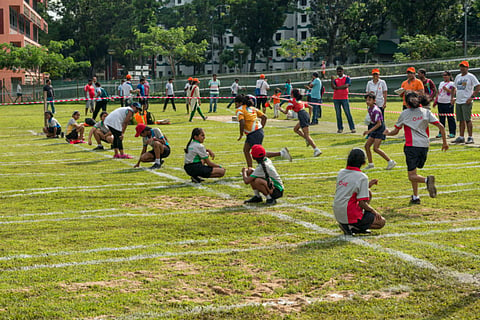Indian school promotes good old childhood games
Conventional sports like kho-kho, kabbadi, langadi and lagori are part of GIIS curriculum to help students build life skills and be less dependent on expensive resources

Dubai: In a throwback to the gadget-free days with good old childhood play, an educational group in the UAE is encouraging its students to embrace traditional Indian games.
Amol Vaidya, director of operations of the Global Indian International School (GIIS), which has two schools in Abu Dhabi and Dubai, said besides regular sports GIIS has also included traditional Indian games like kho-kho, kabbadi, langadi, kancha, lagori and dhori in its curriculum as they impart invaluable lessons.
“Traditional Indian games don’t require expensive resources like special infrastructure, equipment or gear to play. The effort is to get our children to engage themselves critically and creatively without depending on such resources or amenities,” said Vaidya.
Agility
“Playing conventional games helps build life skills. They encourage teamwork and social interaction. Most old school games require agility and movements such as swinging of arms and jumping. This boosts exercise and improves eye-hand coordination. Team games like kabbadi and kho-kho require kids to come up with tactics to defeat their opponent, in turn helping them to strategise and resolve their differences,” said Vaidya.
According to him, traditional Indian games are an extension of yoga. “There are eight sections in yoga out of which three focus on physical well-being, refining the senses, strengthening the body and balancing breathing. All traditional Indian games more or less cover these.”
Unstructured play
He said unstructured play has a vital role in developing various aspects of children’s growth, behaviour and interpersonal skills.
“It helps them focus on all their senses and expand their learning ability.”
Vaidya said the games are played by students across all age groups.
He said GIIS has been hosting the Indian Traditional Games Festival, an annual event in Singapore for eight years.
Traditional games explained
Kabbadi: A contact sport with two teams of seven players who face off in an arena for two halves of 20 minutes each. Players take turns running across the centre line to the other team’s half of the court, tagging members of the other team, and running back.
Kho-kho: A tag sport, it is played by teams of 12 players, of which nine enter the field and avoid being touched by members of the opposing team.
Langadi: A team sport played between two sides with 12 members each and three extras, it entails four innings of nine minutes each. The team that wins the toss defends. The chasing team sends players who hop on one foot and try to tag the defenders. The team that tags the most defenders is declared the winner.
Lagori: A game involving a ball and a pile of flat stones, generally played between two teams. The seekers throw a ball at the pile of stones to knock them over. They then try to restore the pile of stones while the hitters throw the ball at them. If the ball touches a seeker, he is out and his team continues without him.
Kancha: Also called Goti, this is a marble game whose objective is to hit a few marbles on the ground with one’s own marbles using a particular technique.



